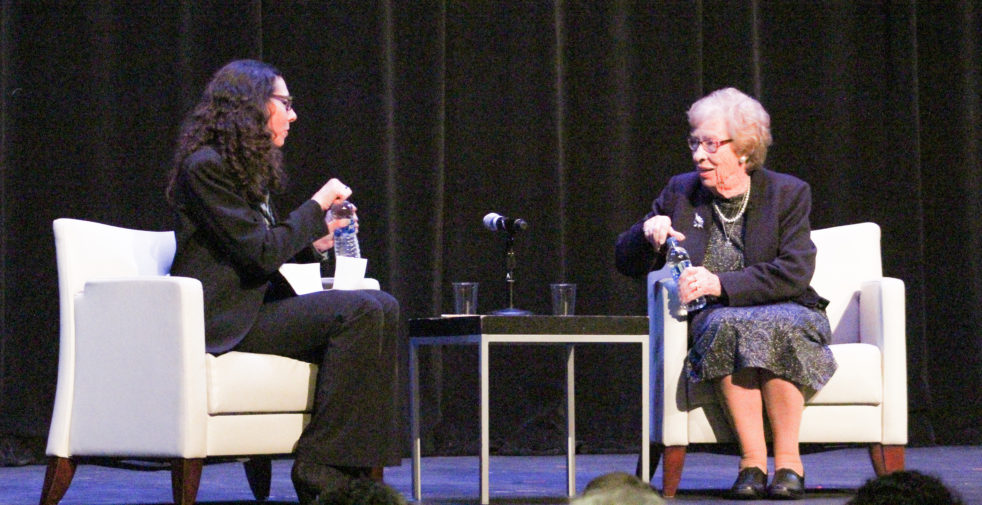It is easy to be pessimistic about the current state of our nation and of our global neighbors. Political divides, social injustices and widening inequalities are just a few of the problems that have yet to be overcome. Despite the turmoil that we currently live under, certain circumstances are still beyond the scope of comprehension. The Holocaust is one such example that cannot be comprehended: no amount of logic, or even imagination, leads us any closer to understanding the horrors its victims endured.
At the start of the Nazi invasion, Eva Schloss was a young girl from Austria whose family fled to Amsterdam where she befriended another young girl by the name of Anne Frank. Eva would eventually become the step-sister to this girl whose diary has taught its readers, among its many lessons, the resilience of the human spirit. Anne would not survive the war. Eva did and has given over one thousand speaking engagements to share her story with others.
Feb. 25 marked a historic night for Tech, a night in which hundreds of attendees at the Ferst Center of the Arts heard the story and insights of Eva Schloss. In attendance was Felicia A. Moore, the president of the Atlanta City Council.
Moore read a proclamation declaring the 25th day of February as Holocaust Awareness Day in the city of Atlanta, in honor of Schloss. All 15 members of the City Council signed the proclamation, and Mayor Keisha Lance Bottoms expressed her support in the fight to end injustices and foster understanding between people from different backgrounds.
As the associate vice president of the Office of Institute of Diversity Julie Ancis said, it is often difficult to realize the importance of remembering the past when trying to build a better future: why is it important to understand history in a world that champions progress and growth at all costs?
The host of the event, Rabbi Ari Sollish of Intown Jewish Academy, offered an explanation for how the past can serve to better the future.
“It is only in preserving, recalling and living with the experiences of the shattered [past] and lives that we can hope to live, we can hope to learn the lessons of how to build a world that is whole and complete and unbroken,” Sollish reasoned.
The sincere, and sometimes even humorous, way in which Schloss shared the story of her broken past not only allowed her listeners to live her experiences with her, but also inspired them to strive for a future free of such brokenness.
When describing the events of her adolescence — of her family going into hiding only to be betrayed by a double agent on her 15th birthday and their subsequent time spent in Auschwitz — Schloss credited a force, that, much like evil, cannot be easily comprehended.
“How to say it?” she asked. “There were many, many — I must call them so — miracles.”
The series of events described by Schloss serve as testimony that miracles often can, and do, happen: was it not miraculous that a wide-brimmed hat was able to hide her young age and save her from being sent to the gas chamber, or that her cousin worked as a nurse and was able to give her life-saving medication for the typhus she had contracted, or that her father was able to visit her one last time in the women’s camp at Auschwitz or that her mother was able to escape after she was sent to the gas chamber? That the writings of her childhood friend Anne along with the artwork her brother had painted while in hiding were able to outlive the war further confirm Schloss’ belief in the power of miracles.
While addressing the younger generation, Schloss not only spoke of the past, but she also gave insight into the future. In speaking of the future, Schloss emphasized the importance of empathy and of caring for others.
“There is no peace anymore with people,” she said. “And this is what we need: we need a bit of peace to reflect on life, on what is happening and what is happening in other places. We have to be more considerate and think of other people … We should look around more, not just in our little circle of people. We have a responsibility to look at the whole world.”
Even from her little hiding spot, Anne Frank’s insatiable eyes took in all they could. By watching and reflecting on the world around her, Anne was able to navigate and comprehend the most difficult of troubles. Her childhood friend Schloss continues this legacy of observing the world and holding herself responsible for the plights of others. Taking this responsibility can seem daunting, sometimes even pointless: how can one person make a difference in something as widespread and forceful as problems like political divides, social injustices and widening inequalities?
Since no easy solution or simple fix can overcome these troubles, people often find themselves lost in trying to solve them, but in the encouraging words of Schloss, “If we all try to do a little bit of good, the world will change.” Small acts of good, when done again and again, do have the power to overcome even the incomprehensible.
